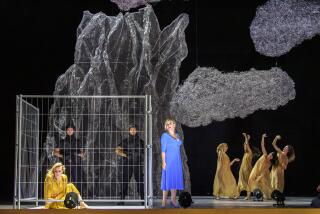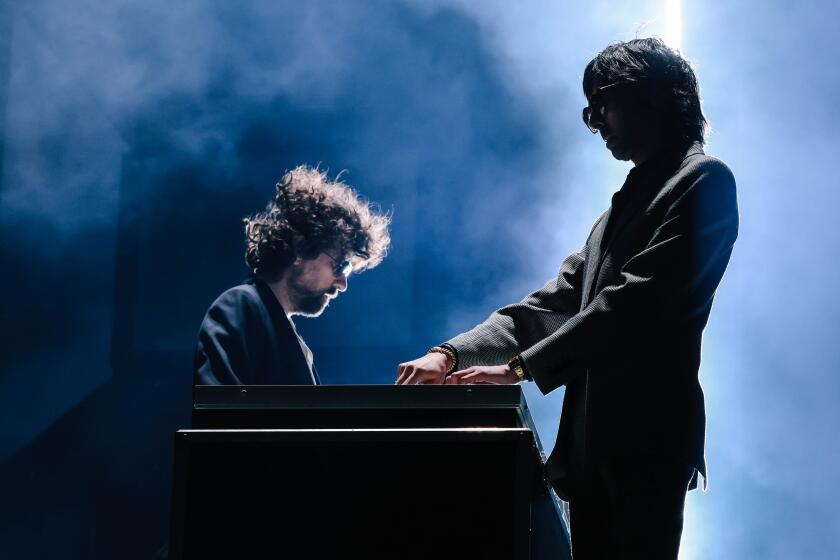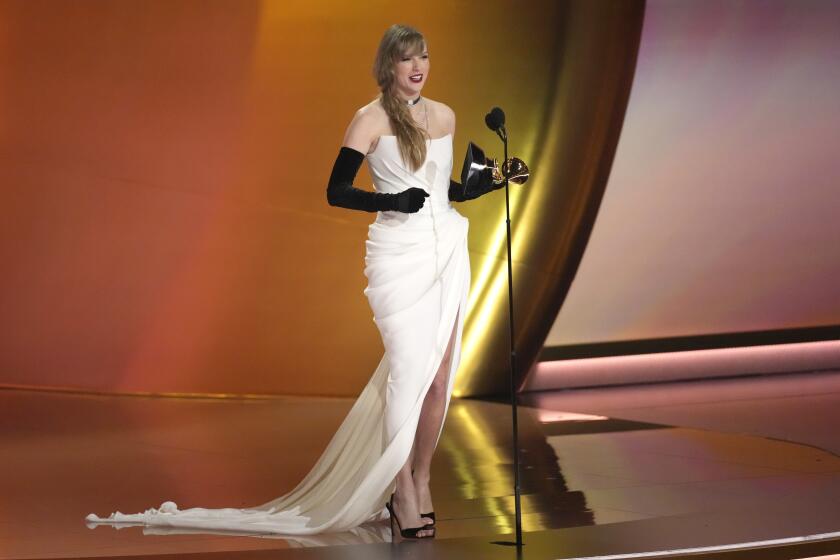Opera personalities voice their displeasure
When you get right down to it, the world of opera is a lot like Hollywood. Both professions are filled with big stars with big egos that often clash in colorful ways. And those egos come attached with spin doctors — publicists, agents, personal managers — who are there to make sure that the clashes don’t reach the public eye.
But sometimes artists spill the beans and word gets out that all is not well behind the scenes. The two lead singers of Los Angeles Opera’s “The Ring of the Nibelung” — tenor John Treleaven and soprano Linda Watson — recently spoke to The Times about their problems with director Achim Freyer’s avant-garde interpretation, harshly criticizing the production for its lack of dramatic depth. Watson went as far as to describe the director’s choices as “insulting.”
Such frank public criticism in advance of an opening represents a break with unofficial opera protocol, according to James Jorden, the New York-based publisher of the popular opera blog Parterre Box. “I would say that in general, the attitude now is to speak off the record or to wait until the production is over. There’s a strong sense of being perceived as a bad colleague.”
Jorden said that in today’s opera climate, companies want to present themselves “as serious entities where people are working hard and everyone is cooperating.”
Opera history is filled with tales of backstage warfare — Maria Callas and Kathleen Battle were both fired from the Metropolitan Opera for their unprofessional behavior — but getting stars to go on the record while in the thick of a troubled production is much rarer.
Much of the time, news of internal strife comes via rumor, hearsay and innuendo. “There will be all kinds of people saying, ‘so and so did so and so,’ but you never know if it’s true or not,” said Andy Karzas, who hosts a weekly opera show on Chicago classical station WFMT.
Other times, the mudslinging happens after the production closes. In 1987, L.A. Opera brought together artist David Hockney and director Jonathan Miller on its production of Wagner’s “Tristan und Isolde.” The show was well-received, but at least after the fact, the two were semi-loquacious about their failure to mesh. “He’s the only director I’ve worked with where we never listened to the music together,” Hockney told The Times in 2008; in 1992, he’d couched things in harsher terms for the Chicago Tribune: “My respect for him just collapsed. I think he is unmusical.”
For his part, Miller complained he’d been reduced to the role of a “real estate agent,” ushering performers around the steeply raked stage Hockney had designed and colorfully lighted. “Hockney’s a Los Angeles star, so I was demoted to the position of butler,” Miller told the San Francisco Chronicle in 1991. A few months earlier, in the New York Times, he had described Hockney’s “Tristan” as “like a pop-up book, thunderously over-colored, and it had nothing to do with me.”
When bad news hits, opera companies often will issue cryptic press releases that leave few clues, forcing fans (and journalists) to read between the lines.
Leonard Slatkin abruptly left the Met’s production of “La Traviata” in April, and the company sent out a release saying the conductor’s departure was due to “personal reasons.” Slatkin had received largely negative reviews for the opening night performance and was rumored to have been ill-prepared for the job.
A statement from Slatkin’s management said the conductor withdrew because his artistic contribution didn’t “coincide with the musical ideas of the ensemble.”
Angela Gheorghiu, the Romanian soprano, is practically a category unto herself. The fiery star, who is nicknamed “Draculetta” by her detractors, was famously fired from a 2007 production of “La Bohème” in Chicago after skipping too many rehearsals.
This season, Gheorghiu pulled out of the Met’s new production of “Carmen,” which was conceived especially for her. At the time, she was going through a separation from her husband, the tenor Roberto Alagna, who was supposed to star alongside her in the opera.
In a statement issued by the Met, the soprano said: “To make so important a debut as Carmen, I want to be as prepared dramatically as I am musically.... I will postpone my role debut until a later date when I can work intensely with the Richard Eyre production.”
More to Read
The biggest entertainment stories
Get our big stories about Hollywood, film, television, music, arts, culture and more right in your inbox as soon as they publish.
You may occasionally receive promotional content from the Los Angeles Times.






